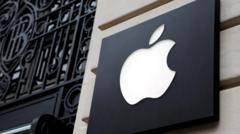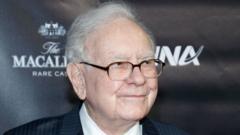In a groundbreaking decision, a US district judge has found Apple in willful violation of an injunction meant to prevent anticompetitive behavior in its App Store operating practices, prompting a potential criminal contempt investigation. Judge Yvonne Gonzalez Rogers accused a top Apple executive of lying under oath while overseeing the case initiated by Epic Games, the creator of Fortnite, which has long contested Apple's app payment policies.
The injunction was intended to facilitate third-party payment options, allowing developers to circumvent Apple's hefty commissions, which usually reach up to 30%. However, Judge Gonzalez Rogers claimed that Apple continued its obstructive practices, and internal documents indicated a deliberate choice to pursue anticompetitive methods.
In her ruling, she highlighted that Apple executives, including CEO Tim Cook, were aware of their actions yet chose a path that interfered with fair competition. "Cook chose poorly," she stated, emphasizing that the company's resistance to comply with the court's requirements would not go unpunished.
Apple's internal communications reportedly showed that the firm continued charging a 27% commission on off-app purchases, a significant change from its previous stance, alongside creating additional hurdles to discourage alternative payment channels.
Responding to the ruling, Apple maintained its disagreement and announced plans to appeal, asserting compliance with the court's order in the meantime. Epic Games' CEO Tim Sweeney expressed optimism about future developments, revealing plans to reintroduce Fortnite to the iOS App Store next week while extending a proposal to Apple to quickly resolve ongoing litigation related to their app payment practices.
Sweeney's statements suggest that Epic Games could abandon future legal disputes in exchange for Apple adopting more equitable payment frameworks that are free from the controversial "Apple Tax." He asserted that Apple's current commissions are now as questionable in the United States as they are in Europe, indicating a broader implications for Apple's business model in the tech landscape.
The injunction was intended to facilitate third-party payment options, allowing developers to circumvent Apple's hefty commissions, which usually reach up to 30%. However, Judge Gonzalez Rogers claimed that Apple continued its obstructive practices, and internal documents indicated a deliberate choice to pursue anticompetitive methods.
In her ruling, she highlighted that Apple executives, including CEO Tim Cook, were aware of their actions yet chose a path that interfered with fair competition. "Cook chose poorly," she stated, emphasizing that the company's resistance to comply with the court's requirements would not go unpunished.
Apple's internal communications reportedly showed that the firm continued charging a 27% commission on off-app purchases, a significant change from its previous stance, alongside creating additional hurdles to discourage alternative payment channels.
Responding to the ruling, Apple maintained its disagreement and announced plans to appeal, asserting compliance with the court's order in the meantime. Epic Games' CEO Tim Sweeney expressed optimism about future developments, revealing plans to reintroduce Fortnite to the iOS App Store next week while extending a proposal to Apple to quickly resolve ongoing litigation related to their app payment practices.
Sweeney's statements suggest that Epic Games could abandon future legal disputes in exchange for Apple adopting more equitable payment frameworks that are free from the controversial "Apple Tax." He asserted that Apple's current commissions are now as questionable in the United States as they are in Europe, indicating a broader implications for Apple's business model in the tech landscape.




















